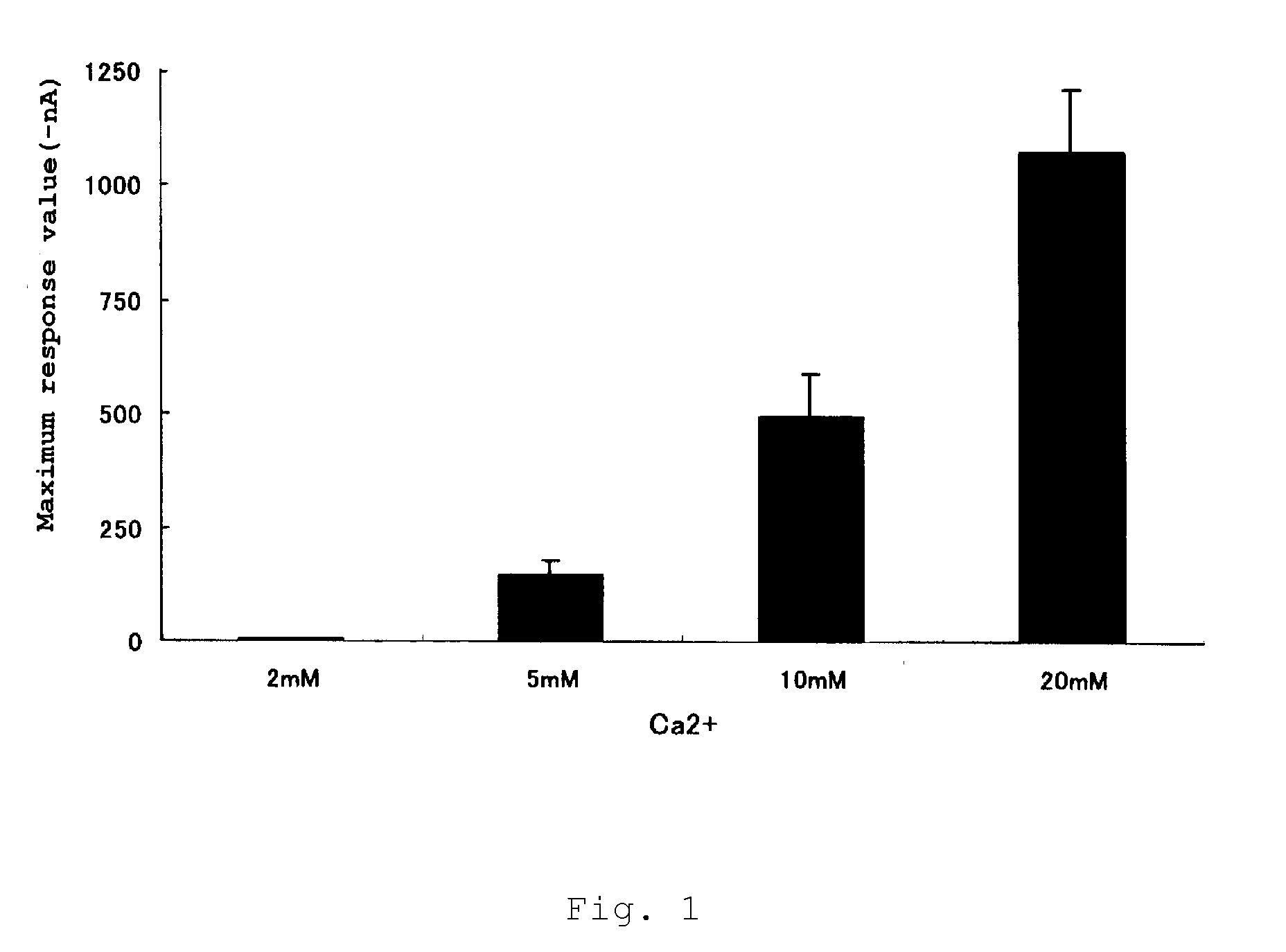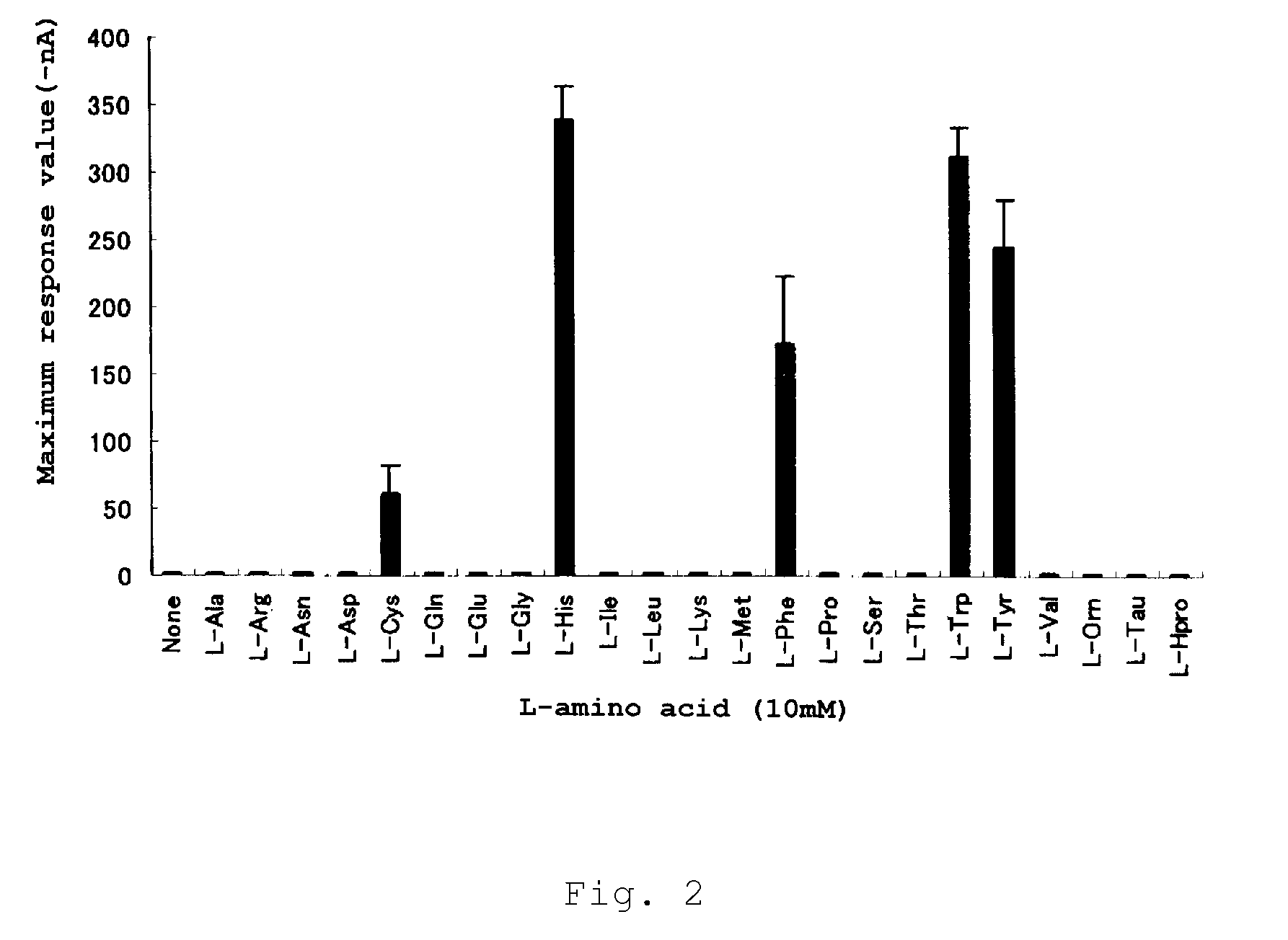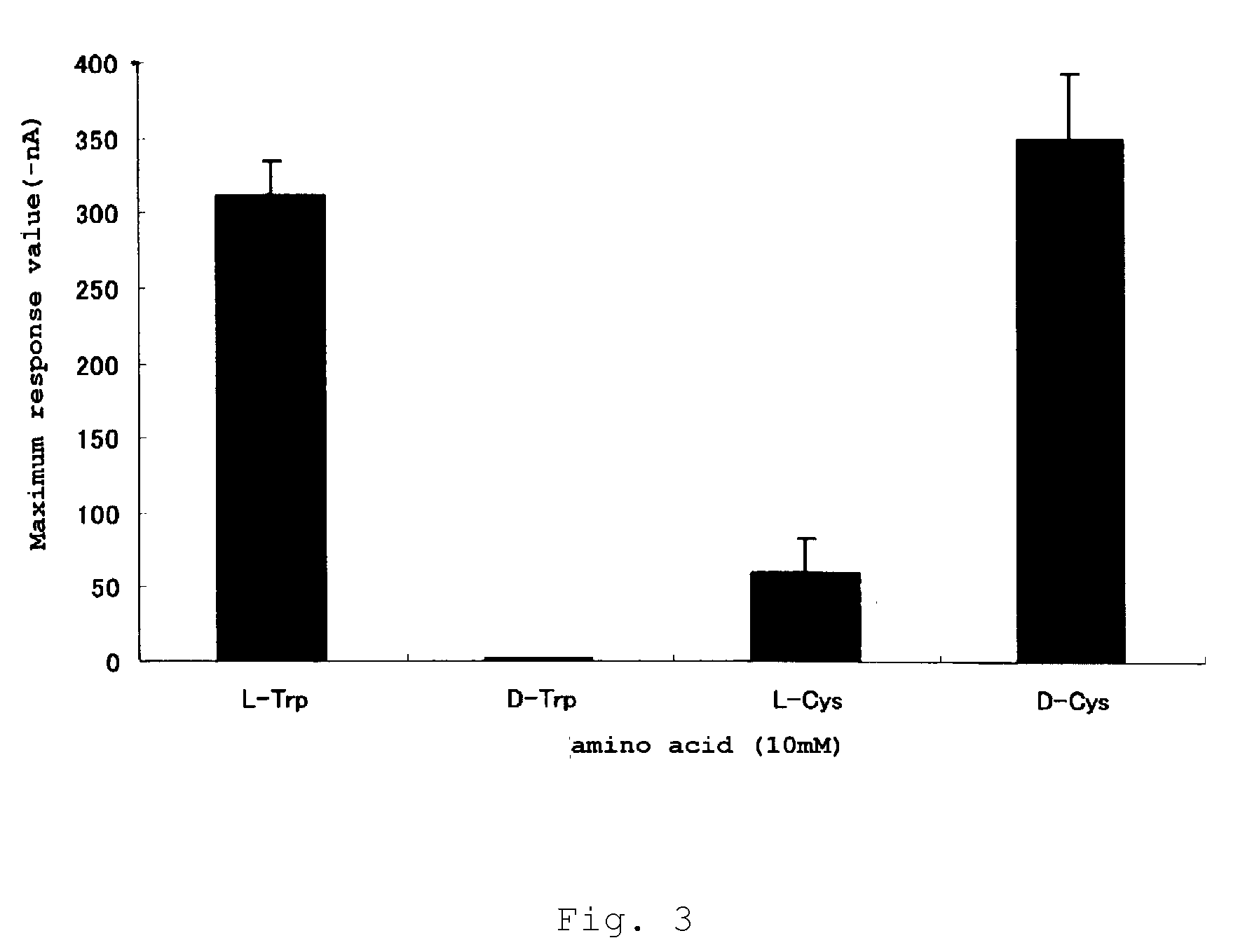Kokumi-imparting agent, method of using, and compositions containing same
a technology of imparting agent and composition, which is applied in the direction of instruments, peptides/protein ingredients, peptides, etc., can solve the problems of insufficient activity, permeability, side effects, and difficulty in using as calcium receptor activators, and achieves convenient and highly sensitive, safe and inexpensive, and high activity.
- Summary
- Abstract
- Description
- Claims
- Application Information
AI Technical Summary
Benefits of technology
Problems solved by technology
Method used
Image
Examples
example 1
Preparation of Gene (cRNA)
[0126]The gene encoding the calcium receptor was prepared as follows. On the basis of the DNA sequence registered at NCBI (calcium receptor: NM—000388), synthetic oligo DNAs (forward primer (N) and reverse primer (C)) were prepared based on the DNA sequence registered at NCBI for the calcium receptor (NM—000388), and used for PCR (Table 1, SEQ ID NOS: 1 and 2).
[0127]
TABLE 1Synthetic oligo DNAs (forward primer (N) andreverse primer (C), h: human)CodeSequence (5′-3′)hCASR_NACTAATACGACTCACTATAGGGACCATGGCATTTTATAGCTGCTGCTGGhCASR_CTTATGAATTCACTACGTTTTCTGTAACAG
[0128]The primers shown in Table 1 (hCASR_N (SEQ ID NO: 1) and hCASR_C (SEQ ID NO: 2)) were synthesized from human kidney cDNA (Clontech), and PCR was performed with Pfu ultra DNA Polymerase (Stratagene) under the following conditions: after a reaction at 94° C. for 3 minutes, a cycle of reactions at 94° C. for 30 seconds, 55° C. for 30 seconds, and 72° C. for 2 minutes was repeated 35 times, and then a rea...
example 2
Preparation of Various Samples
[0129]23 special grade amino acids were employed, including alanine, arginine, asparagine, aspartic acid, cysteine, glutamine, glutamic acid, glycine, histidine, isoleucine, leucine, lysine, methionine, phenylalanine, proline, serine, threonine, tryptophan, tyrosine, valine, ornithine, taurine (all of these from Ajinomoto), and hydroxyproline (Nakarai Tesque). Special grade amino acids were also used as D-Cys and D-Trp (Nakarai Tesque) and calcium chloride. Furthermore, the following peptide samples were used: γ-Glu-Cys-Gly (Sigma Aldrich Japan), γ-Glu-Cys(SNO)-Gly (Dojin Chemical Laboratory), γ-Glu-Ala (Bachem Feinchemikalien AG), γ-Glu-Gly (Bachem Feinchemikalien AG), γ-Glu-Cys (Sigma Aldrich Japan), γ-Glu-Met (Bachem Feinchemikalien AG), γ-Glu-Abu-Gly (Abu: α-aminobutyric acid, Bachem Feinchemikalien AG), γ-Glu-Thr (Kokusan Chemical), γ-Glu-Val (Kokusan Chemical), γ-Glu-Leu (contract manufactured product), γ-Glu-Ile (contract manufactured product), γ...
example 3
Synthesis of γ-Glu-Val-Gly
[0130]Boc-Val-OH (8.69 g, 40.0 mmol) and Gly-OBzl•HCl (8.07 g, 40.0 mmol) were dissolved in methylene chloride (100 ml), and the solution was maintained at 0° C. Triethylamine (6.13 ml, 44.0 mmol), HOBt (1-hydroxybenzotriazole, 6.74 g, 44.0 mmol), and WSC•HCl (1-ethyl-3-(3-dimethylaminopropyl) carbodiimide hydrochloride, 8.44 g, 44.0 mmol) were added to the solution, and the mixture was stirred overnight at room temperature. The reaction mixture was concentrated under reduced pressure, and the residue was dissolved in ethyl acetate (200 ml). The solution was washed with water (50 ml), 5% citric acid aqueous solution (50 ml× twice), saturated brine (50 ml), 5% sodium hydrogencarbonate aqueous solution (50 ml× twice), and saturated brine (50 ml). The organic layer was dried over anhydrous magnesium sulfate, then the magnesium sulfate was removed by filtration, and the filtrate was concentrated under reduced pressure. The residue was recrystallized from ethyl ...
PUM
| Property | Measurement | Unit |
|---|---|---|
| pH | aaaaa | aaaaa |
| temperature | aaaaa | aaaaa |
| electrode voltage clamp | aaaaa | aaaaa |
Abstract
Description
Claims
Application Information
 Login to View More
Login to View More - R&D
- Intellectual Property
- Life Sciences
- Materials
- Tech Scout
- Unparalleled Data Quality
- Higher Quality Content
- 60% Fewer Hallucinations
Browse by: Latest US Patents, China's latest patents, Technical Efficacy Thesaurus, Application Domain, Technology Topic, Popular Technical Reports.
© 2025 PatSnap. All rights reserved.Legal|Privacy policy|Modern Slavery Act Transparency Statement|Sitemap|About US| Contact US: help@patsnap.com



